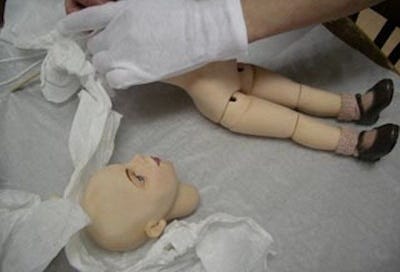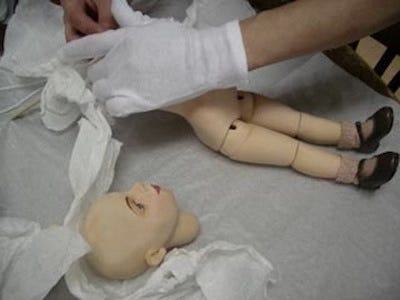your face has been loved for generations.
a deep-dive into plastic surgery, beauty standards, sexiness, and gratitude
In sci fi and predictive fiction of past decades, plastic surgery has continually been shown as an illness of the future. In Alejandro Jodorowsky’s 1973 film The Holy Mountain, a successful company sells masks to the masses to match an individual’s desired appearance (and which “feel like real skin.”) In Terry Gilliam’s 1985 film Brazil, a running gag features an old woman continuing to get plastic surgery that further worsens her condition to a comical extent. Historically, plastic surgery is not depicted in fiction as something normal or indicative of societal well-being. The reasons for this feel self-evident.
Attempting to sell people the idea that beauty can be bought is, alone, quite disturbing. This is something that has been thematically identified in media and culture for decades; to be consumed by the vain desire for eternal beauty is to lose sight of a life well-lived. Yet, nevertheless, we are consumed completely. Beauty is everywhere; it shines outward from within, and it is most impactful when it is individual. Sadly, In a capitalist society with a reputation for spurring on mass consumption of the same products and services via media trends, it’s no surprise every major star has the same face. That doesn’t mean it shouldn’t terrify us.
“Male fantasies, male fantasies, is everything run by male fantasies? Up on a pedestal or down on your knees, it's all a male fantasy: that you're strong enough to take what they dish out, or else too weak to do anything about it. Even pretending you aren't catering to male fantasies is a male fantasy: pretending you're unseen, pretending you have a life of your own, that you can wash your feet and comb your hair unconscious of the ever-present watcher peering through the keyhole, peering through the keyhole in your own head, if nowhere else. You are a woman with a man inside watching a woman. You are your own voyeur.” - Margaret Atwood
How does Atwood’s ever-relevant pondering apply differently when every waking moment is able to be captured? When real life begins to feel to many young people like an opportunity to be seen, rather than a moment to be fully felt? In an article by Newsweek1 a psychologist perfectly describes this phenomenon; “human brains aren't designed to evaluate themselves in every waking moment as we look at our phones and social media pages. This, combined with a culture that fears death and aging can bring an influx of worry to the younger generation.”
More than ever, the hyper-focus on and algorithmic advantage won by photographable beauty and consumer jealousy rules the online spaces surrounding young girls. “Sex sells” as they say; catering to the male fantasy is the easiest way to win a following online. Little girls glued to their phones are privy to this; it’s no surprise that the inescapable inner voyeur may be appearing in younger and younger girls.
To many, girlhood is defined by a lack of body awareness, a disregard for outside perception. Girls should be put on track to find interests and friendship and hobbies to explore, to develop a life and identity apart from their physical appearance. According to Freudian ideas of child psychology, a girl at this age should be in the latent period, with no reason to be aware of herself as a sexual being. Nobody should be defining themselves by their sexualization and public perception, least of all a child. This trap is easy to fall into in teenage years, as self-awareness and bodily discomfort reaches a peak. However, for a little girl to prioritize beauty - or more disturbingly, the male attention that is supposed to come with it - is nothing short of tragedy.
According to a survey2 of a group of 13- to 17-year-olds, one in four say they plan to get cosmetic surgery to prevent aging. Boys are being affected too; with 20 percent of boys in the survey saying they planned on cosmetic surgery, compared to just 17 percent of girls. Most likely, this is due to widespread male loneliness and depression, as well as the fixation on physique in hypermasculine spaces which target young boys and men.
In a famous and highly praised interview with Keira Knightley, the actress says “I would never judge women for how they respond to society’s demands, but I do judge the society that demands them.”
… Did this society she speaks of form independently of the people within it? Is it, at this point in time, some kind of dictatorship that we are being subjected to? By responding to these demands, do we not contribute to the society we claim to hate, continuing the cycle?
As a woman, you are faced with a slew of reasons to hate yourself and a constant onslaught of products to change your appearance, from plastic surgery to beauty and skincare products. This all comes in the form of advertising, magazines, celebrity idolatry, and of course, social media and its infestation of hatred towards every type of body and facial feature possible.
However, no matter how difficult facing the impending ugliness of our society may be, it doesn’t alleviate your responsibility to engage with the media around you in a critical way. It doesn’t alleviate your responsibility to act in accordance with the society you wish to see. You do not exist inside the confines of your phone; it is a virtual reality plagued by standards which may apply to the success of instagram photos, but not the beliefs and behaviors of the well adjusted in real life.
If you talk to a group of men or women, chances are, each one will have their own entirely unique perspective on what is attractive and beautiful to them. You will hear, about the most “ideal” features, “Yes, ___ looks nice, but I personally prefer ___.” This fact is easily forgotten when engaging in online discourse where from every direction, someone whose brain has been infected with copious insecurity is screaming. When the same bodies and features are repeatedly deemed as ideal online, corroborated by comments from hoards of insecure young people trapped in social media addiction, it isn’t hard to see the issue. It isn’t a magazine cover anymore - it’s all round you. If you don’t disengage completely or act against it, you will join the hoard eventually. The fact is, these ideals are not real; they only exist behind the screen.
On videos of women who have received plastic surgery, people will openly express preference for their natural faces. Cited in these comments is often the fact that they looked more “genuine” “happy” and most notably, that they had “unique” or “distinctive” features which made them truly attractive.
When everyone strives for the same body ideals, the entire premise of beauty is lost. Historically, specific (albeit changeable) ideals are upheld; hourglass figures and chiseled abs are praised. Often in discussions around beauty it is posited that these ideals apply to everyone living under them - something entirely ridiculous. Beauty is far more real and tangible in the outside world where it is entirely subjective and applicable to everyone (it’s true - even you!) Unique, striking and yes, even and OFTEN features which are not deemed “ideal” by the media can be the most intriguing, sexy and captivating. An average person in their most vulnerable and unabashedly awkward state is far more evocative than a staged photoshoot, heavily made-up and posed. Beauty and love, beauty and personal connection, are most intrinsically intertwined.
Sexiness is not the glossy sheen of a playboy cover girl but someone shedding that layer of shame and being unabashedly wanting. What’s sexy is what’s uncomfortable, our deepest and most unhinged desires, thrust out into the open. It’s sweaty and dirty and awkward and that is why it makes you feel something. The beauty of sex and feeling sexy is not about fitting an ideal, it is about being known. It is enjoying all of the strange and vulnerable details of the human body, simultaneously disgusting and alluring.
That being said… the world of pornography today, to nobody’s surprise, may be another major culprit for plastic surgery normalization. It’s no secret that plastic surgery is widely normalized within the porn industry along with other unrealistic bodily procedures. Anal bleaching and bikini waxes are standard in studio porn, showing young men and women entirely unrealistic bodies and often disturbingly surgically enhanced models.
Porn stars have come out since the very start of the industry to describe abuse both on and off set from co-stars and managers; from Mia Khalifa being exploited by huge companies like Bang Bros to Chloe Cherry being given an eating disorder as an already ultra-petite star. In an interview with Refinery29, Adult star Lindsey Leigh details her nearly nine thousand dollars she spends on beauty and bodily enhancement. In the article she says, “As I’ve aged through this industry, it’s become more about keeping a youthful look…Not so much that I want to look 18 when I'm 29, but I don't want to be put into the M.I.L.F. category. As I've progressed, it’s been about taking off years, and enhancing things like my butt and boobs and lips."3
According to BBC figures, “More than one in four young women in Britain has considered getting cosmetic surgery after seeing the beauty standards displayed in pornography. Around 40% of young women say porn has made them more concerned about how their breasts look, and 37% say it’s made them concerned about how their vagina looks. 60% of women say porn sets an unrealistically high bar for what bodies should naturally look like, and one in five men agreed they’d also thought about changing their body because of porn.”4
Most disturbingly, according to an article by Fight the New Drug,5 between 2013 to 2016 the rate of labiaplasty went up 112.5%. Additionally, the number of patients 18 years and younger getting the procedure increased by 253.8% in just three years. In an article by Reuters on the topic, Harriet Lerner, a psychologist, explains that “Even when women are told of potential complications, like insensitivity of the clitoris ... they still may be unstoppable if they have the notion that they need a younger-looking or more perfect or more desirable vulva."6 The horrifying implications of that statement are in no need of explanation.
Over half of Pornhub’s viewership comes from Gen Z, according to an article from Daily Sundial.7 If young people are constantly engaging with content of plastic bodies and blatantly phony sexual interaction, how will they develop a healthy relationship to their own body or anyone else’s? How can genuine sexuality flourish if all you’ve been fed is a sterile product built for instant gratification? The bodies in porn do not represent what is beautiful or sexy in real life, and the sex in porn most definitely doesn’t represent what good sex looks like. However, with so much of our generation plugged into this virtual nightmare, reality becomes hard to distinguish.
To be clear, there are some very good reasons for plastic surgery to exist. A few positive examples would be the treatment of bells palsy by botox, reduction of loose skin after weight loss, or breast implants after a Masectomy. Cosmetic surgery can serve to help people who have undergone real changes to their body that could cause them discomfort, or have true deformities, injuries and health conditions that may significantly lower quality of life. According to an article by Leora Behavioral Health, Approximately 37% of patients undergo procedures to correct deformities caused my illness and accidents. 8
Unfortunately, it appears that a huge chunk of the patients for plastic surgery have no medical reason to receive it. On a breakdown of the most common plastic surgery procedures done by each generation in 2022, most are entirely unnecessary and purely aesthetic; tummy tucks, butt lifts and rhinoplasties being at the forefront.9 Leora Behavioral Health also found that 47% of patients change their appearance to “enhance their physical appearance” and “achieve a more youthful look.” Ironically, the article claims that only 15% change their appearance “due to social or cultural pressures” - as if this 15 is at all distinct from the 47. Do we truly believe that this lack of confidence in appearance is distinct from social and cultural pressures? We are not distinct from our environment; we shape and are shaped by it. Often our tastes and beliefs are influenced by media attitudes towards our bodies, whether we want to believe ourselves to be above it or not.
Most disturbingly, according to several clinical trials, it is very likely for patients, especially those with severe confidence issues and warped self-perception, to end up dissatisfied. A study of cosmetic surgery patients who received treatment for minimal defects found that 7 out of 10 of those who had BDD received surgery. The study states, “At follow-up, most continued to have BDD and had developed new appearance preoccupations. In a survey of 265 cosmetic surgeons, 178 reported treating patients with BDD, with only 1% of cases resulting in symptom improvement.”10
I argue that unnecessary plastic surgery is a result, as with all that is sinister in this world, of ingratitude. Plastic surgery seeks to rid people of the features which define their roots, the intricacies of their lineage, and which make their appearance most unique. The “beauty standard” is designed to inspire ingratitude, rather than appreciation. If you were never told your small chest or big nose was undesirable by media, would you despise it? Or would you be able to appreciate how your body reflects that of your family, the people you love most, generations upon generations of people being loved for their beauty? Would you still be able to look at yourself as you once did as a child, and see in your outer appearance simply a reflection of your soul, detached from any external value?
Your natural appearance is a gift. Out of every possible body you could’ve been born in, you were given this one. If it is functioning and in good health, you are blessed beyond belief; you should be grateful for every extension of your arm and flex of your fingers and step of your foot. You can dress it up and make it up and work it out and as it changes along your life it will reflect you more deeply.
But most importantly, you are generations of love. Before you, hundreds of people with your distinct features - even and especially the ones you hate - were loved. When you spit on what they created in you, you disrespect everything that came before you. When you have a child, she may be more likely to feel shame for the body she was born in.
Be prideful in all that makes you strange. Desire is the most abundant resource in the universe. You are more than an exhibition to be drooled at; and true beauty dies in conformity. Do not burn yourself up and with it all of your potential. In gratitude, your beauty will shine out and surround you with love forever.
https://www.newsweek.com/teens-are-planning-get-plastic-surgery-aging-1893903
https://www.newsweek.com/teens-are-planning-get-plastic-surgery-aging-1893903
https://www.huffingtonpost.co.uk/entry/a-quarter-of-british-women-say-porn-has-made-them-seriously-consider-cosmetic-surgery_uk_5c87eea1e4b0450ddae4d5ed
https://www.reuters.com/article/idUSDEE87O04S/
https://sundial.csun.edu/168783/print-editions/this-generation-loves-porn-how-is-it-affecting-their-perception-of-intimacy/
https://www.leorabh.com/blog/plastic-surgery-statistics






This was absolutely beautiful. I loved all the material and thought put into this. The writing style is captivating, strict and still poetic. This deserves so much more attention. You are a great writer and I’ll be sure to check out your other work. Thank you❤️
i loved this and it deserves so much more attention!